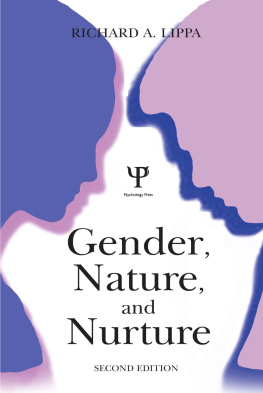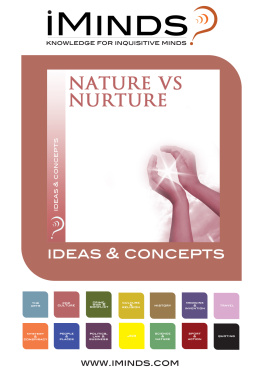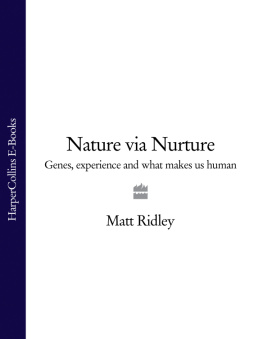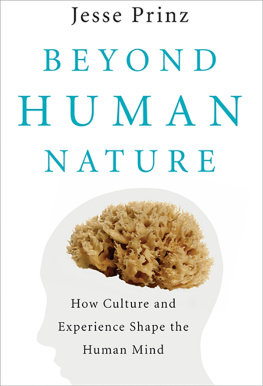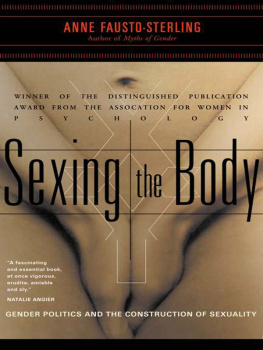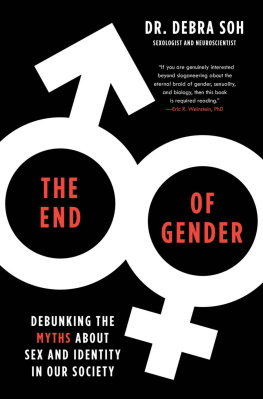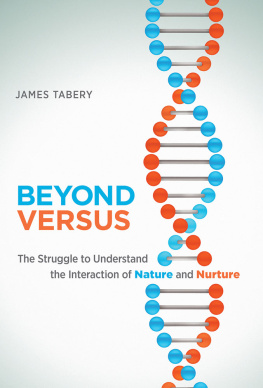Lippa Richard A. - Gender, Nature, and Nurture
Here you can read online Lippa Richard A. - Gender, Nature, and Nurture full text of the book (entire story) in english for free. Download pdf and epub, get meaning, cover and reviews about this ebook. year: 2005, publisher: Taylor and Francis;Psychology Press, genre: Romance novel. Description of the work, (preface) as well as reviews are available. Best literature library LitArk.com created for fans of good reading and offers a wide selection of genres:
Romance novel
Science fiction
Adventure
Detective
Science
History
Home and family
Prose
Art
Politics
Computer
Non-fiction
Religion
Business
Children
Humor
Choose a favorite category and find really read worthwhile books. Enjoy immersion in the world of imagination, feel the emotions of the characters or learn something new for yourself, make an fascinating discovery.
- Book:Gender, Nature, and Nurture
- Author:
- Publisher:Taylor and Francis;Psychology Press
- Genre:
- Year:2005
- Rating:5 / 5
- Favourites:Add to favourites
- Your mark:
- 100
- 1
- 2
- 3
- 4
- 5
Gender, Nature, and Nurture: summary, description and annotation
We offer to read an annotation, description, summary or preface (depends on what the author of the book "Gender, Nature, and Nurture" wrote himself). If you haven't found the necessary information about the book — write in the comments, we will try to find it.
Gender, Nature, and Nurture — read online for free the complete book (whole text) full work
Below is the text of the book, divided by pages. System saving the place of the last page read, allows you to conveniently read the book "Gender, Nature, and Nurture" online for free, without having to search again every time where you left off. Put a bookmark, and you can go to the page where you finished reading at any time.
Font size:
Interval:
Bookmark:

Gender, Nature, and Nurture
Second Edition
Richard A. Lippa
California State University, Fullerton

First published 2005 in Great Britain by
Psychology Press Taylor & Francis Group
This edition published 2014
by Psychology Press
711 Third Avenue, New York, NY 10017
and by Psychology Press
27 Church Road, Hove, East Sussex, BN3 2FA
Psychology Press is an imprint of the Taylor & Francis Group, an informa business
2005 by Taylor & Francis Group, LLC
Psychology Press is an imprint of Taylor & Francis Group
International Standard Book Number-13: 978-0-8058-5344-2 (Softcover)
Library of Congress Card Number 2005001509
All rights reserved. No part of this book may be reprinted or reproduced or utilised in any form or by any electronic, mechanical, or other means, now known or hereafter invented, including photocopying and recording, or in any information storage or retrieval system, without permission in writing from the publishers.
Trademark notice: Product or corporate names may be trademarks or registered trademarks, and are used only for identification and explanation without intent to infringe.
Library of Congress Cataloging-in-Publication Data
Lippa, Richard A.
Gender, nature and nurture / Richard A. Lippa.2nd ed.
p. cm.
Includes bibliographical references and index.
ISBN 0-8058-5344-8 (hbk: alk. paper)ISBN 0-8058-5345-6 (pbk.: alk. paper)
1. Sex differences (Psychology). 2. Gender identity. 3. Nature and nurture. I. Title.
BF692.2.L555 2005
155.3'3dc22 2005001509
ISBN-13: 978-1-410-61294-6 (ebk)
In loving memory of my mother, Alice Lippa
I don't know about you, but throughout my life I have been puzzled by the behavior of both men and women. When I go to the gym, I am bemused by men's animated conversations about football games and cars, and when I go to a local gift shop, I am equally bemused by women who endlessly discuss how "darling" various ceramic figurines are. I don't think I am alone in finding both men and women somewhat inscrutable, each in their own way. And I am certainly not alone in pondering the nature and nurture of gender.
Most of us spend a considerable amount of time trying to understand what makes individual boys, girls, men, and women tick, so most of us constantly grapple with gender, either consciously or unconsciously. We live and work and play with members of both sexes, and inevitably, we love and loathe individual males and females. If nothing else, the topic of gender carries with it immense egocentric appeal, for we all possesses gender, in one form or another. And of course, the topic of gender is intimately tied to other favorite topics: love, sex, and romance. In a more serious and political vein, our personal views of gender are linked to other important attitudes, about affirmative action, sexual harassment, women in the military, and a host of other topics. For all of these reasons, gender is a hot topic: in everyday conversations, on talk shows, and in popular books.
Gender is also a hot topic among scientists. It has long been the focus of a veritable cottage industry of empirical research in the social and biological sciences, and after decades of concerted effort, scientists now have a lot to say about the causes and consequences of gender. The book you are about to read Gender, Nature, and Nurture , second editionpresents a straightforward and accessible summary of scientific findings about gender. It offers a balanced and fair-minded account of what science currently does and does not know about the behavior of males and females, and it describes the major theories that have attempted to explain gender differences, gender similarities, and gender variations.
Because Gender, Nature, and Nurture is, on one level, a primer of gender research, it is ideally suited for classes on the psychology of women, the psychology of men, gender roles, and gender. It can also serve as a stimulating accompaniment to introductory psychology and critical thinking classes, for it addresses many mainstream topics in psychology (personality, abnormal behavior, social behavior, cognitive abilities, biological psychology, behavioral genetics, evolutionary psychology) from the vantage point of a single unifying themegender. Students who read Gender, Nature, and Nurture will necessarily exercise their critical thinking skills as they evaluate competing theories and integrate complex strands of empirical evidence. They will also learn how scientific research applies to real-life, public policy questions. They will come to appreciate that science is an ongoing debate as much as a fixed and finished body of facts.
Gender, Nature, and Nurture should appeal to the general reader, too, because it provides a readable, up-to-date summary of research on a topic that affects us all. In addition to presenting scientific findings, the book tackles many important real-life questions. Should boys and girls be reared alike? Should mothers be granted custody of young children more often than fathers? Is sexual violence a male rather than female problem, and does it have biological roots? Should corporations treat male and female employees the same? Why do men still earn more than women do, and what should society do about this difference? What roles should women and men assume in the military? Consideration of these questions demonstrates that scientific research can have important social consequences and that the nature-nurture debate is not just an academic exercise.
Reflecting the rapidly evolving research literature on sex and gender, the second edition of Gender, Nature, and Nurture addresses many new topics and findings. The added content includes the following:
- Updated research on sex differences in personality
- Results of a meta-analysis of sex differences in real-life measures of aggression
- Discussion of sex differences in children's activity levels
- Discussion of sex differences in moral thought and behavior
- Research on cross-cultural consistencies and variations in men's and women's sexual behavior
- Research on sex differences in antisocial behavior
- An expanded account of sex differences in children's play
- Research on masculinity, femininity, and psychological adjustment
- A section on nonhormonal, direct genetic effects on sexual differentiation
- An expanded account of social learning theories of gender
- An expanded account of social contructionist views of gender
- A section on hormones and maternal behavior
- A section on the digital divide and research on male's and female's attitudes toward computers
- A section on gender, work, and pay
Writing a book is a complex process that involves many people. The following reviewers carefully read the first edition of Gender ; Nature, and Nurture and offered many valuable and constructive suggestions for the second edition: Nanci Weinberger of Bryant College; Sharon G. Portwood of the University of Missouri, Kansas City; Mary E. Kite of Ball State University; Christia Spears Brown of the University of California, Los Angeles; and Lori Van Wallendael of the University of North Carolina, Charlotte. Thanks to Lawrence Erlbaum Associates Editor, Debra Riegert, for guiding this project from inception to completion. Thanks, too, to Larry Erlbaum for supporting this project, and thanks to the Erlbaum staff for transforming a set of word processing files into an attractive, finished book. And most of all, thanks to the many scholars who have ceaselessly probed the nature and nurture of gender. Their work encourages us all to celebrate the amazing diversity of men and women and to appreciate the common humanity of all people, regardless of their sex or gender.
Font size:
Interval:
Bookmark:
Similar books «Gender, Nature, and Nurture»
Look at similar books to Gender, Nature, and Nurture. We have selected literature similar in name and meaning in the hope of providing readers with more options to find new, interesting, not yet read works.
Discussion, reviews of the book Gender, Nature, and Nurture and just readers' own opinions. Leave your comments, write what you think about the work, its meaning or the main characters. Specify what exactly you liked and what you didn't like, and why you think so.

